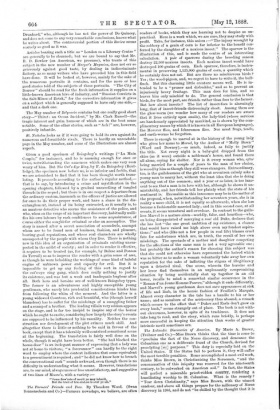There is enough to marvel at in the history of
the young lady who gives her name to Marvel, by the Author of "Molly Bawn "
(Ward and Downey),—so much, indeed, as fully to justify the title. Not every night is a baby-girl dropped from the skies (as it were) outside a nobleman's house, and found there
all alone, crying for shelter. Nor is it every woman who, after
being married for a couple of years to the man of her choice,. is wooed by him as though they still were strangers. Extraordinary, too, is the guilelessness of the girl who at seventeen calmly asks a young man to marry her, without the least idea that she is doing anything out of the common ; and a year or so later, is too inno- cent to see that a man is in love with her, although he shows it un- mistakably, and her friends tell her plainly what the state of his sentiment is. Excusable as this innocence may be in the matter of the proposal, when, notwithstanding her seventeen years, she is in reality a mere child, it is not equally so afterwards, when she has. become a fashionable married lady; and in this second case, at all events, it seems unnatural and overdone. In contrast to the guile-
less Marvel is a mature siren—worldly, false, and heartless—who, on being disappointed of marrying a roue old Duke, declares that
she has lost "the one great ambition of my existence, a chance that would have raised me high above even my fondest aspira- tions ;" and who (like not a few people in real life) blames cruel fate for misfortunes which are, in truth, the result of her own misdoings. The spectacle of a mother and daughter competing for the affections of the same man is not a very agreeable one; but probably the author's reason for choosing this subject was that she could not otherwise have represented tho hatred which was so bitter as to make a woman voluntarily take away her own reputation for the sake of inflicting the stigma of illegitimacy upon a detested rival. One scene, wherein the heroine and her lover find themselves in an unpleasantly compromising situation by being accidentally shut up together in an old tower, recalls to mind a somewhat similar occurrence in the "Roman d'un Jenne Homme Pauvre," although it ends differently, and Marvel's young gentleman does not save appearances at risk of life and limb, in the heroic fashion of Feuillet's Marquis.
Almost every character in the tale has a handle to his or her name; and as members of the aristocracy thus abound, a remark
which occurs to the effect that "Dukes and Earls don't grow on every bush," seems strangely out of place. The book is not with- out cleverness, however, in spite of its trashiness. It does not take long to read, and the story, which runs briskly, is perhaps more successful in keeping the attention than works of greater intrinsic merit sometimes are.


































 Previous page
Previous page